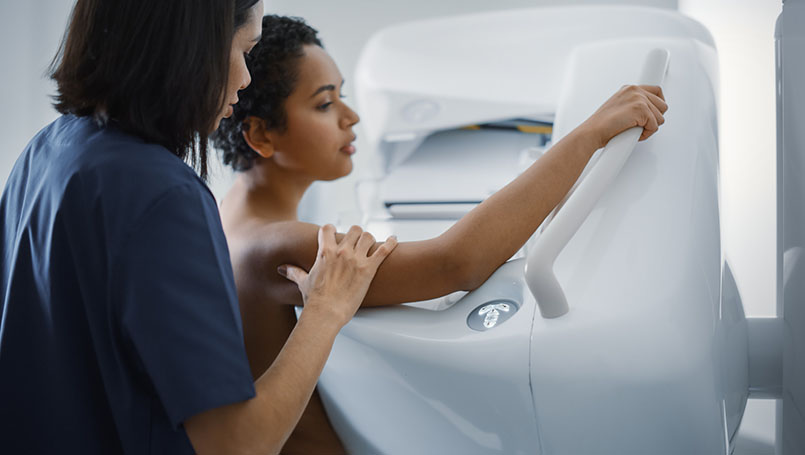Monday, October 09, 2023

Ever heard that deodorant will give you cancer? That you shouldn’t wear a bra for fear of a tumor? Or how about the notion you can’t do anything to prevent breast cancer?
These are indeed common myths with little scientific evidence to back them up.
Myth 1: Women do not need to start checking for breast cancer until age 40.
Women—and men—can develop breast cancer at any age. Although mammograms may not start until women are in midlife, women and men should know what is normal for their breasts. Your primary care provider should evaluate any lumps, discharge, or skin changes in the breasts if they persist through a menstrual cycle or become anxiety-producing. For men, any lumps in the breast should be evaluated by a physician.
Myth 2: I found a lump in my breast, so I have breast cancer.
No one should jump to conclusions upon finding a lump in your breast. Only a small percentage of breast lumps turn out to be cancer. 8 out of 10 lumps are benign cysts or fatty deposits and have no link to cancer. If you find a new breast lump or have any concerns about changes in your breasts, be sure to see a physician for an examination and discuss how to proceed. Your physician may order an ultrasound or mammogram to determine if the lump is of concern.
Myth 3: Men don’t get breast cancer.
The chance is small—about one in 1,000—but men do get breast cancer. According to the American Cancer Society, about 2,470 new cases of invasive breast cancer in men will be diagnosed this year, and about 460 men will die from breast cancer.
Breast cancer in men is usually found as a hard lump or mass beneath or around the nipple. Men should quickly see their physician for evaluation if a lump is found. Men have a higher mortality than women with breast cancer, likely due to delays in seeking treatment; they don’t consider breast cancer as a possibility.
Myth 4: A mammogram can cause breast cancer to spread.
There is a popular myth that says the compression of the breast that occurs during a mammogram causes breast cancer to spread. This has no basis in truth. Women are encouraged to continue to get regular mammograms and follow the recommendations of their physicians.
Myth 5: Antiperspirants cause breast cancer.
There is no scientific evidence that deodorants or antiperspirants cause any type of cancer.
Myth 6: Bras cause breast cancer.
There is no scientific evidence that bras cause breast cancer, according to the American Cancer Society, Komen Foundation and the National Institutes of Health.
Myth 7: There is nothing you can do to lower your risk of developing breast cancer.
Not true. It is estimated that up to 90 percent of all breast cancers are largely due to lifestyle and environmental factors. Keep your risk as low as possible be, maintain a healthy weight, exercise regularly, don’t smoke, and limit the amount of alcohol you drink.
Myth 8: Most women with breast cancer have cancer in their family.
Family history is a risk factor related to breast cancer, but only 5 to 10 percent of breast cancers are thought to be hereditary, which means they are caused by abnormal genes passed from parent to child. The other 90 percent are largely due to lifestyle and environmental factors.
According to the National Cancer Institute, a woman’s chance of developing breast cancer increases if her mother, sister, and/or daughter have been diagnosed with the disease, especially if they were diagnosed before age 50. Having a close male blood relative with breast cancer also increases a woman’s risk of developing the disease.
Therefore, it is important for women to be aware of their family history of this disease. If breast cancer runs in your family, you will be encouraged to start screening early and may also be encouraged to undergo genetic testing. The cancer genetics program can provide these services to patients.
Myth 9: Women with a BRCA gene mutation will get breast cancer.
Genetic testing can tell us a great deal about a woman’s chances of developing breast cancer. According to the National Cancer Institute, about 12 percent of women in the general population will develop breast cancer some time during their lives. However, 55 to 65 percent of women who inherit a harmful BRCA1 mutation and 45 percent of women who inherit a harmful BRCA2 mutation will develop breast cancer by age 70.
However, nothing is a certainty. It is important for women to work closely with their providers to consider all options if they are found to have either BRCA1 or BRCA 2 gene mutations.
